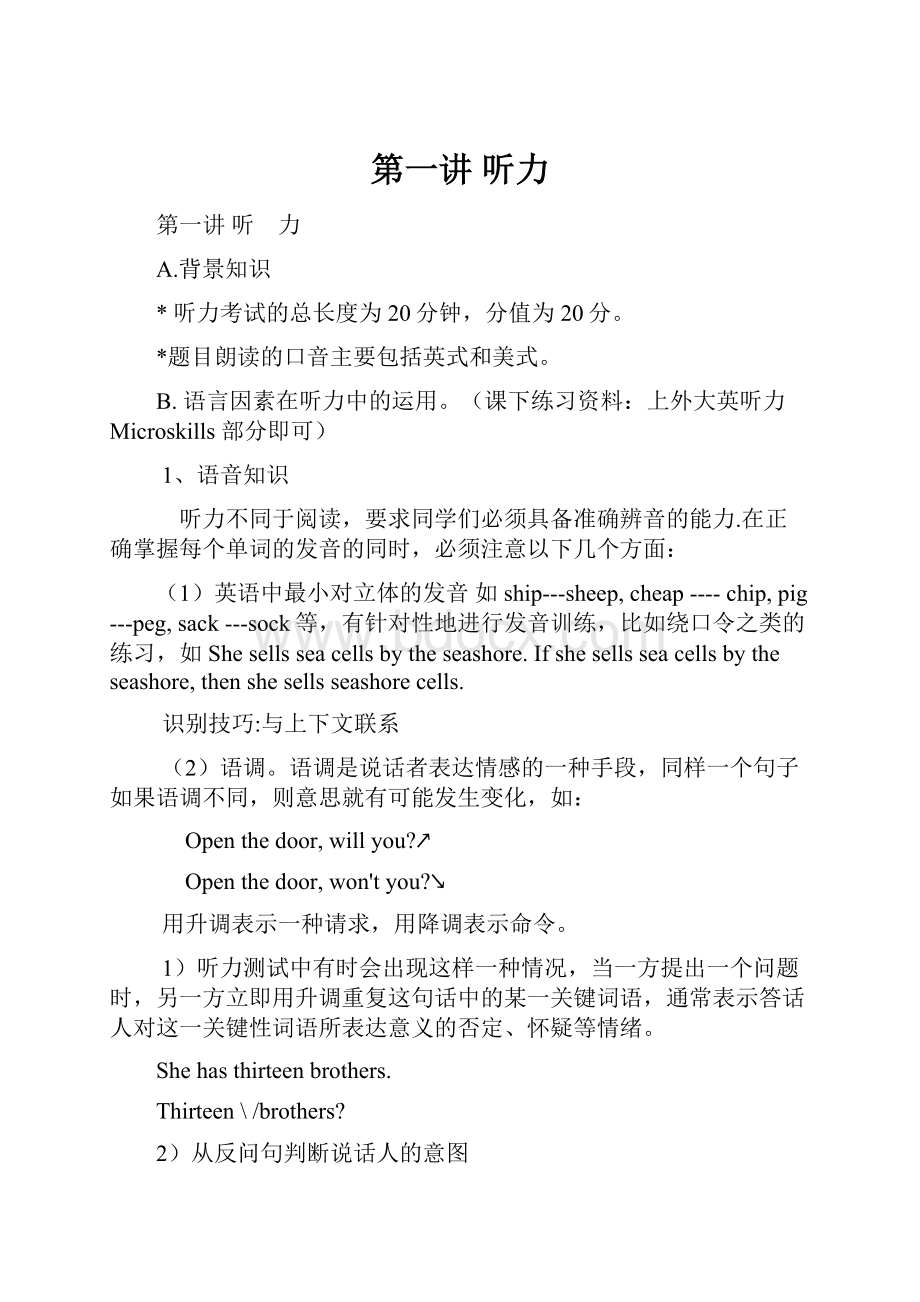第一讲 听力.docx
《第一讲 听力.docx》由会员分享,可在线阅读,更多相关《第一讲 听力.docx(19页珍藏版)》请在冰豆网上搜索。

第一讲听力
第一讲听 力
A.背景知识
*听力考试的总长度为20分钟,分值为20分。
*题目朗读的口音主要包括英式和美式。
B.语言因素在听力中的运用。
(课下练习资料:
上外大英听力Microskills部分即可)
1、语音知识
听力不同于阅读,要求同学们必须具备准确辨音的能力.在正确掌握每个单词的发音的同时,必须注意以下几个方面:
(1)英语中最小对立体的发音如ship---sheep,cheap----chip,pig---peg,sack---sock等,有针对性地进行发音训练,比如绕口令之类的练习,如Shesellsseacellsbytheseashore.Ifshesellsseacellsbytheseashore,thenshesellsseashorecells.
识别技巧:
与上下文联系
(2)语调。
语调是说话者表达情感的一种手段,同样一个句子如果语调不同,则意思就有可能发生变化,如:
Openthedoor,willyou?
↗
Openthedoor,won'tyou?
↘
用升调表示一种请求,用降调表示命令。
1)听力测试中有时会出现这样一种情况,当一方提出一个问题时,另一方立即用升调重复这句话中的某一关键词语,通常表示答话人对这一关键性词语所表达意义的否定、怀疑等情绪。
Shehasthirteenbrothers.
Thirteen\/brothers?
2)从反问句判断说话人的意图
M:
IthinkI'mgoingtogiveupplayingtennis.Ilostagaintoday.
W:
Just because you lost,isthatthereasontoquit?
Q:
Whatdoesthewomanimply?
Youranswer____________________________________________
#Iwantchoosefourcoursesfornextsemester
won’tfourbewiser?
Youranswer___________________________________
#Iamgoingtospendthemorningsightseeing.
whynotthewholeday?
Youranswer__________________________________________
#W:
Wheredoyouwanttoeat?
M:
Isthereanythingwrongwiththe↘coffeeshop?
Q:
Whatdoesthemanmean?
Youranswer______________________________
4)反意疑问句
#M:
I'mterriblysorryI'mlate,butIjustcouldn'thelpit.
IgotthereassoonasIcould.
W:
Well,it'snotsoonenough,↘isit?
(3)连读:
连读时语速加快,连读的单词之间没有了间隔,会给理解带来困难。
如:
inˇorˇout,yearˇinandyearˇout,forˇanˇhour
(4)失去爆破takepartin,postpone
(5)强读/弱读thebustheearthbotherusitisthemnotus
(6)词重音contentrecord
(7)句重音Johnboughtabikeyesterdayatthedepartmentstore.
(8)意群:
听力时不能一个单词一个单词地去理解,应该注意意群,因为意群之间间隔之处正是停顿之处,注意下列语句朗读时停顿的差别:
Johnsaid,"Myfatherishere."
"John,"saidmyfather,"ishere."
Shelikespineapples.
Shelikespieandapples.
Hesoldhishouseboatandtrailer.
Hesoldhishouse,boat,andtrailer.
(9)注意同音字:
有些单词发音相同,也可能给听力理解带来困难,如:
Whatisblackandwhite,andread(red)allover?
这里在听的时候,很难分请是read还是red。
(10)连写you'rerightyourright
(11)美式英语两个元音之间的轻辅音浊化Bettyboughtabitofbetterbutter
(12)同化词内newspaper,
语流usedtolastyearwould/couldyou
2、词汇和语法
(1)加强同义表达方式的听力训练:
在听力选择中,相当一部分情况下,答案就是对话信息的同义表达方式。
如:
①W:
Thespeechtheblindgirlgavethiseveningwasextremelytouching.
M:
Ithinkeverybodyfeltthesame.
Q:
Howdidthemanfeelaboutthegirl'sspeech?
Youranswer___________________________________
A.Itwasboring.B.Itwasentertaining.
C.Itwasmoving.D.Itwasencouraging.
②M:
Nancy,whywereyoulatetoday?
W:
Ioversleptandmissedthebus.
Q:
WhywasNancylate?
(1999.1)
Youranswer________________________
A.Shegotuplaterthanusual.B.Thebuswaslate.
C.Sheforgotshehadclasses.D.Herclockwasslow.
(2)加强语法概念的单句理解练习:
听力测试中有相当一部分情况下,有对语法结构表意功能的考查,如虚拟语气的含义,建议的表达方式等。
如:
①W:
Wedoneedanotherbookshelfinthisroom.Buttheproblemisthespaceforit.
M:
Howaboutmovingtheolddiningtabletothekitchen?
Q:
Whatdoesthemansuggesttheyshoulddo?
(1995.6)
Youranswer________________________
A.Findingalargerroom.B.Selltheoldtable.
C.Buytwobookshelves.D.Rearrangesomefurniture.
②W:
Themoviestartsin5minutesandthereisboundtobealongline.
M:
Whydon'twecomebackforthenextshow?
I'msureitwouldbelesscrowded.
Q:
Whatisthemansuggesting?
(1996.6)
Youranswer_____________________
A.Comingbackforalatershow.B.Waitinginaqueue.
C.Comingbackinfiveminutes.D.Notgoingtothemovietoday.
③M:
Whatdoyouthinkofmypaper?
W:
Theideasaregood.IfIwereyou,though,I'drewritethelasttwoparagraphstomakeitbetter.
Q:
Whatisthewoman'scommentontheman'spaper?
(1996.1)
Youranswer_________________________
A.Theideasofthepaperarenotconvincing.
B.Somepartsofthepaperarenotwellwritten.
C.Thehandwritingofthepaperisnotgood.
D.Thepaperisnotcomplete.
(3)熟悉常用常考短语、口语、俚语
outofquestion/outofthequestion
getsomethingacrossputupwithcalloff/putoffnotfeeloneselfundertheweather
pullone'slegcannotwaittocountthedays
(4)弄清楚到底是肯定还是否定
farfromit
itisimpossiblewithout
canhardly/seldom/few/little/afew/alittle/quietafew/notafew/notalittle/notabit
youcanneverbetoocareful
icanagreewithyoumore
nothingbut/anythingbut/allbut/byallmeans/bynomeans
(5)特别要熟悉各个类型的比较格式
1)倍数+形容词/副词比较级+than
Thegirlistentimesclevererthanherbrother.
2)倍数+as+形容词/副词/(名词)+as
Hisapartmentisthreetimesaslargeasthatofmine.
Americanseat()astheyactuallyneedeveryday.(CET-41998,6)
A)twiceasmuchproteinB)twiceproteinasmuchtwice
C)twiceproteinasmuchD)proteinastwice
3)倍数+名词
Thesunismanytimesthesizeofthemoon.
4)动词+倍数
Thepantshaveshortenedtwotimessincetheywerebought.
5)动词+by+数词/百分比/倍数
Thelandlordwantedtoraisetherentbyathird.
Between1974and1997,thenumberofoverseasvisitorsexpanded
()27%.(CET-42000,1)
A)byB)forC)toD)in
I.对话:
CET对话式听力题指导
1、问题类型
A节每组对话一般是在一男一女之间进行的一问一答。
问题一般由先讲话的人提出。
题目均以问句形式出现,其中多数是特殊疑问句。
这些问题涉及的内容大致归纳如下:
A、多用来问以下内容:
1)问“是什么、要什么、讨论什么、什么种类”等,如:
What is the man’s answer?
What does the woman want for lunch?
What are they talking about?
What kind of books does the man want to borrow?
2)问“做什么”,如:
What does the woman tell the man to do first?
What are the speakers doing now?
What will happen if John fails the exam?
3)问“什么含义”,如:
What does the man mean(imply)?
What does the woman’s answer suggest?
4)问“从对话中能获得什么信息或结论”,如:
What can we learn from the conversation?
What can be concluded from this conversation?
5)问“对某人或某事有什么看法”,如:
What does the man think of Miss Brown?
What does the woman think of the plan?
B、A节中用提出的问题主要问“对话可能是在什么场所发生的”,即:
Where does this conversation most probably take place?
Where does this conversation most likely occur?
Where are the man and woman?
C、可能问以下几个方面的情况:
1)问钟点(可用替换),如:
Man(M):
What time did yesterday’s football match start?
Woman(W):
It was supposed to start at a quarter to 7, but it was delayed an hour.
Question(Q):
When did the game finally start?
2)问在哪个星期或星期几(后者可用替换),如:
W:
I thought to go to town now. I have some shopping to do.
M:
Don’t spend too much, I won’t get paid until next week.
Q:
When will he be paid?
3)问日期,如:
When will the winter vacation begin?
D、用提问的问题可以问原因,也可以问目的,如:
Why is the man late?
Why did the man repair the car by himself?
E、可能问对话者某一方的身份、对话人之间的关系或对话中涉及到的其他人的情况,如:
W:
May I help you ,Sir?
二、M:
I hope so. It’s my watch. I brought it in to be repaired, but I’ve lost the Receipt.
Q:
Who is the man?
F、主要针对以下内容提问:
1)问做某事的方式、方法或使用的交通工具,如:
How did the teacher usually begin his class?
How does the man usually go to work?
2)问“对某事的感受如何”,如:
How does the man feel about the movie?
How do you like the film?
G、问“多少”,属于涉及数字的题,可能有以下几种形式:
How many persons ...?
How many dozens of ... does ... want?
How much does ...?
How old is ...?
How long does it take ... to ...?
A节的问句根据疑问词划分,大致可以归为以上七类。
A节中偶尔也有个别一般疑问句。
但也可能出现其它类型的问句,(如以Whom,Whose,Which提问),或针对以上未归纳的内容进行提问。
2、对话内容分类
若按对话内容分类,则可分为以下几种类型:
A、时间类:
包括直接型和计算型。
如:
W:
Your library books are due on December 13th. If you have not finished using them by then, you may renew them once.
M:
Thank you very much . I only need them for a few days.
Q:
When must the man return his books to the library?
B、数字类:
包括直接型和计算型。
如:
W:
Do you live in a college dormitory?
M:
Yes, I do. It’s a six-man suite, but at the moment only four of us live there.
Q:
How many people share the suite now?
C、地点类:
包括直接型和含蓄型。
如:
M:
I need to cash this check?
W:
Will you step right over to the teller’s window, please?
Q:
Where is the conversation most probably taking place?
D、否定类:
此类对话既可以含有not,no,neither,nor等否定词,也有but,although等转折词,或由would rather,too...to结构及虚拟语气等表达。
因此,对于后者要特别加以注意。
如:
M:
Ann, do you have any extra money you could loan me?
W:
I wish I could help you. I went shopping yesterday. Now I have only two dollars till the end of the week.
Q:
Will the man borrow any money from the woman?
此题的答案肯定是No。
听这段话时要抓住I wish I could help you.这一关键话语。
这句话虽然从表面上看是肯定式,但却隐含着I’m sorry I can’t help you.的意思。
E、人物类:
包括人物关系、人物身份两类。
此类对话提供一个情节,能反映所涉及的人的关系或身份。
如:
M:
Good evening, Madam. There is a table for two over there. This way, please.
W:
Thank you. Could I see the menu, please?
Q:
What’s the relationship between the man and woman?
A) Husband and wife. B) Waiter and customer.
C) Salesman and customer. D) Host and guest.
F、活动类:
这一类谈话内容可涉及上课、娱乐、工作、日常生活等各种
情况。
如:
W:
Are you going to New York next weekend?
M:
Yes, I’m going to look up Bill while I’m there.
Q:
What’s the man going to do?
这类对话中往往先后出现几种情况,要注意听问句是什么,然后再作出选择。
3、几种常见的解题方法
A节中的对话虽然简短,但多数情况下,往往不能从听到的内容中找到与选择项内容完全相同的部分,即对话中一般没有现成的答案。
因此,在听的时候要注意抓住选择项的同义或反义词(组)用辨别法答题(解活动类多用此方法),或根据对话内容采用归纳、推论或辨别的方法回答。
用这种方法答题,类型不仅仅限于诸如"what does the man mean?
"这样的题目,其它如含蓄人物类、人物身份类、含蓄地点类、否定类题目也与此类似。
如:
W:
How do you like the play you saw last night?
M:
Well, I should have stayed at home.
Q:
What does the man think of the play?
A) It is exciting. B) It is boring.
C) He didn’t see the play. D) He like it very much.
对话中“I should have stayed at home.”(我真该待在家里),这句话已婉转地表明他不喜欢这出戏,而对没有待在家里表示遗憾、后悔(should have done something这种结构可用来表示“对应该发生而实际上没有发生的事情表示遗憾、后悔或谴责”)。
能使他产生此感想的原因自然是“The play is boring.”(演出令人厌烦),因而B是正确的答案。
否定类题目多含有虚拟语气、语气否定、暗示比喻、强化